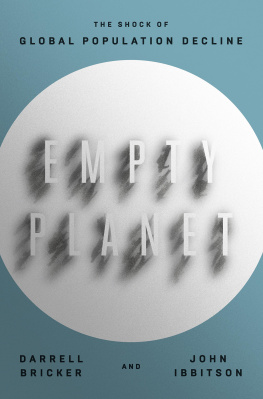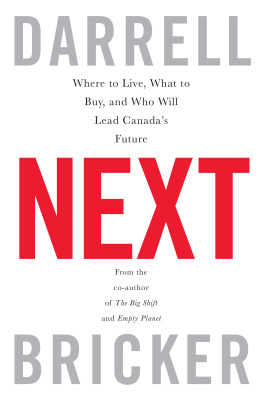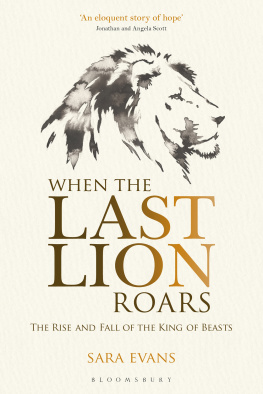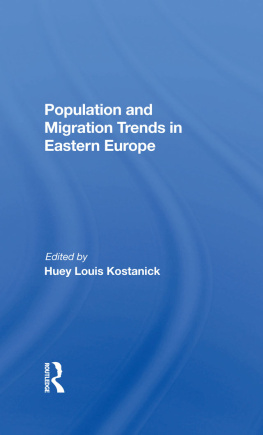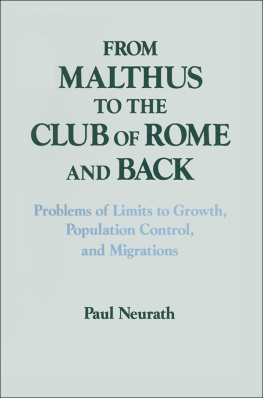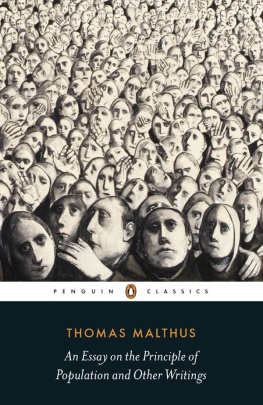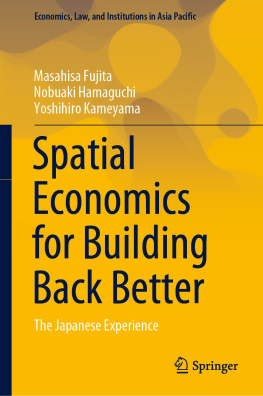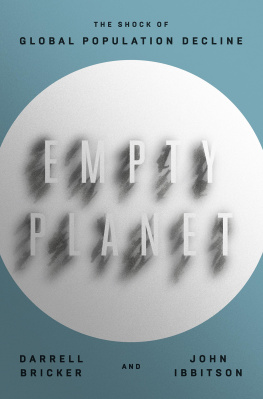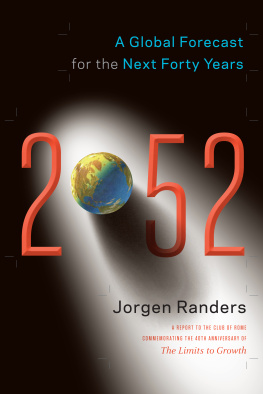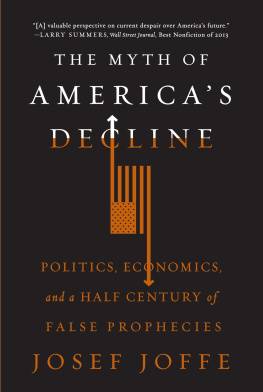Contents
Landmarks
Print Page List
ACKNOWLEDGMENTS
The authors are grateful to their agent, John Pearce, who enthusiastically embraced this book from the very beginning. Our editor, Douglas Pepper, kept us on the right track from start to finish; Empty Planet would have been a much lesser book without him. We slept well at night knowing that Tara Tovell copy-edited and proofread the manuscript. To everyone at Signal and McClelland & Stewart, our sincere thanks. If anything did creep in that shouldnt have, thats on us.
From Darrell Bricker: A project as big as this book involves many people. Those who were kind enough to share their knowledge through interviews are mentioned throughout the book. Others who helped in notable ways include Priscilla Branco, Henri Wallard, Leciane Amadio, Cal Bricker, Joseph Bricker, Clifford Young, Bobby Duffy, Gideon Skinner, Simon Atkinson, Ben Page, Mike Colledge, Becky Hunter, Amit Adarkar, Tripti Sharma, Parijat Chakraborty, David Somers, Roger Steadman, Tom Wolf, Hilda Kiritu, Rod Phillips, Virginia Nkwanzi, Danilo Cersosimo, Mari Harris, John Wright, Mark Davis, Sharon Barnes, Michael Barnes, and Robert Grimm. I would also like to thank my colleagues around the world at Ipsos Public Affairs, many of whom also helped along the way.
Most of all I would like to thank Didier Truchot, CEO of Ipsos. Not only has he given me the opportunity to work as CEO of Ipsos Public Affairs, an incredible platform for any social researcher, he has also encouraged me (even pushed me) to be curious about the world.
From John Ibbitson: I had the good fortune to teach a graduate seminar in global population decline in the autumn of 2016 at the University of Ottawa. I am grateful to Roland Paris for extending that invitation, and to Kayanna Brown, Mathieu Cusson, Rahul Kitchlu, Mohammed Omar, and Laurence Villeneuve, whose contributions enriched this book.
My thanks to Judith Lindikens and Nathaniel Boyd for arranging a dinner party in Brussels, and to Bavo Olbrechts, Sofi Peppermans, Adrien Lucca, Estelle De Bruyn, Pieter Geenen, Helena Desiron, Thierry Homans, Daneel Bogaerts, Nele Lambrichts, and Stef Kunnecke for putting up with my bothersome questions.
To everyone at the Globe and Mail, from my colleagues in the Ottawa bureau to bureau chief Bob Fife, editor-in-chief David Walmsley and publisher Philip Crawley, please know that working with you is a joy and a privilege.
And last and most, to Grant, always.
ONE
A Brief History of Population
We came so close to not being at all.
There were only a few thousand humans left, maybe fewer, clinging to the shores of southern Africa, on the brink of oblivion.Homo sapiens was already in trouble; although we had mastered tools and fire during our 130,000-year history to that point, the earth was in a cooling cycle that had wiped out much of the food supply. Now Toba made things much, much worse. We foraged for tubers and harvested shellfish in the last inhabitable African enclaves. One more bit of bad news, and that might have been the end of us.
This, at least, is one theory held by anthropologists and archeologists; there are others who suggest humans had already migrated out of Africa by this time and that the impact of Toba is exaggerated. But its hard to abandon the thought of a bedraggled humanity on the cusp of extinction struggling to nourish its few remaining young in a hardscrabble world, before the skies cleared, the earth wobbled, and the sun once again warmed the land.
But we moved slowly. The bravest humans in history might have crossed the straits between Southeast Asia and Australia some fifty thousand years ago. (Though there is new evidence suggesting they might have gotten there earlier.)
Around twelve thousand years ago, first in the Middle East and then, independently, elsewhere around the world, the most important of all human discoveries extended our lives and increased our numbers. People started to notice that seeds dropped from grasses produced new grasses the next year. Instead of wandering from place to place, herding and hunting animals and gathering fruits and grains, it made more sense to stay put, planting and harvesting the crops and tending the livestock. But not everyone was needed in the fields, so labor began to specialize, which made things complicated, which led to government and an organized economy. The hunter-gatherers retreated slowlya few are with us to this day in isolated settingsbut civilization emerged. Sumer, Egypt, the Xia Dynasty, the Indus Valley, the Mayans.
Progress was uncertain. The rise and fall of empires signaled waning-and-waxing stress: the planet warming or cooling and wreaking havoc with harvests; the arrival of the latest viral or bacterial scourge. Knowledge was lost that had to be painfully relearned. At first the East lagged behind the West, because it had been settled later, but by the time of Christ, the Roman and Han empires were roughly equivalentso equivalent that each might have brought about the downfall of the other. Each evolved their own unique combination of deadly diseases, writes Ian Morris, and until 200 BCE these developed almost as if they were on different planets. But as more and more merchants and nomads moved along the chains linking the cores, the disease pools began to merge, setting loose horrors for everyone.
From the dawn of civilization in Mesopotamia and Egypt around 3200 BCE through to the dawn of the Renaissance in 1300 CE , the story was the same: some combination of geography, leadership, and technological advance conferred advantage on this tribe or that people, who conquered all before them. In the peace that followed, roads were built, plows improved, laws passed, taxes gathered. Then something happened: bad harvests, contagion, far-off tumult that sent warriors fleeing or raiding from the periphery to the center, which could not hold. Collapse. Rebuild. Repeat.
Yet not all progress was lost, and as East or West or South declined, things got better elsewhere. Islam preserved knowledge lost to the West with the fall of Rome, even as India discovered the zero, which made so much possible. The latest plague produced the latest antibodies to resist it. In Eurasia, at least, immunity became a powerful tool of progress.
The planets population grew from those few thousands in the wake of the Toba eruption to between five and ten million during the first agricultural revolution. At 1 CE there were perhaps three hundred million. By 1300 CE , with China united, enlightened, and advanced under the Song Dynasty, Islam stretching from India to Spain, and Europe finally emerging from its post-Roman Dark Age, the global population had peaked at around four hundred million. And then the most terrible thing happened.
Yersinia pestis, the bacterium that causes the bubonic plague, has long been with us. One theory holds that the lands between the Black Sea and China are a plague reservoir, where the bacillus has long been, and is still, present. (There are occasional cases in the region even today.)
There had been reports of outbreaks throughout ancient times; the first fully documented episode, the Plague of Justinian, broke out in 541 CE , crippling that Byzantine emperors hopes of recapturing the lost territories of the Roman Empire. In any event, the disease was carried by ship from Crimean to Mediterranean ports.
Europe was uniquely vulnerable. A period of global cooling had depleted harvests, leaving people hungry and with their immune systems weakened. War was also stressing local populations. But despite all the bad news, the economy and population of medieval Europe were rapidly expanding after Dark Age centuries, with unprecedented growth in travel and trade between cities and regions. For all these reasons, the disease was able to spread rapidlytwo kilometers a day along major routes, with ships allowing the fleas to hopscotch into northern Europe almost immediately. Within three years, the entire continent was gripped by plague.

